continental congress

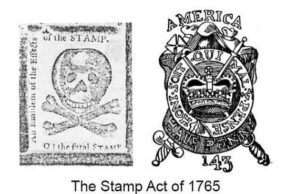 When this country was young, in fact, shortly before the Declaration of Independence was signed, and during a March 19, 1775, speech before the second Virginia Convention, Patrick Henry (39 years old) responded to the increasingly oppressive British rule over the American colonies by declaring, “I know not what course others may take, but as for me, give me liberty or give me death!” The speech so impressed so many people that following the signing of the American Declaration of Independence on July 4, 1776, Patrick Henry was appointed governor of Virginia by the Continental Congress. He couldn’t have fully known with the future might bring, but I think he might have had an inkling of what an oppressive government could potentially do to a nation. His words were a warning, not only to his generation, but to generations to come.
When this country was young, in fact, shortly before the Declaration of Independence was signed, and during a March 19, 1775, speech before the second Virginia Convention, Patrick Henry (39 years old) responded to the increasingly oppressive British rule over the American colonies by declaring, “I know not what course others may take, but as for me, give me liberty or give me death!” The speech so impressed so many people that following the signing of the American Declaration of Independence on July 4, 1776, Patrick Henry was appointed governor of Virginia by the Continental Congress. He couldn’t have fully known with the future might bring, but I think he might have had an inkling of what an oppressive government could potentially do to a nation. His words were a warning, not only to his generation, but to generations to come.
This young nation had been overtaxed, underrepresented, and in some ways enslaved, and they were done with it. The first major American opposition to British policy came in 1765 when Parliament passed the Stamp Act, which was a taxation measure to raise money for a standing British army in America. Basically, the Americans were being forced to pay for an army that was to keep them in line. That brought about the protest of “no taxation without representation,” and colonists convened the Stamp Act Congress in October 1765 to vocalize their opposition to the tax. With the enactment of the Stamp Act Congress on November 1, 1765, most colonists called for a boycott of British goods and organized attacks on the customhouses and homes of tax collectors. After months of protest, Parliament repealed the Stamp Act in March 1766. Their plan had worked.
Even with the taxation of the Stamp Act, most colonists quietly accepted British rule, thinking that it was best not to cause trouble, but when Parliament enacted the Tea Act in 1773, which granted the East India Company a monopoly on the American tea trade, the American people had had enough. The Tea Act was viewed as another way to gouge the people with unfair taxation, militant Patriots in Massachusetts organized a protest that became known as the “Boston Tea Party,” at which, protesters dumped British tea valued at approximately 10,000 pounds into Boston Harbor. Of course, the “Boston Tea Party” and other blatant destruction of British property absolutely enraged Parliament. They enacted the Coercive Acts, also known as the Intolerable Acts, in the following year. The Coercive Acts closed Boston to merchant shipping, established formal British military rule in Massachusetts, made British officials immune to criminal prosecution in America, and required colonists to quarter British troops. The oppressive, tyrannical rule just continued to grow worse. The British thought that if they could keep the colonists “under their thumb,” as it were, they could basically make slave workers out of them, and gouge them for the monies to keep Britain running smoothly. The colonists had other ideas, and so they called the first Continental Congress to consider a united American resistance to the British…finally!!
Massachusetts would lead the way of resistance against the British, with the other colonies watching intently. They formed a shadow revolutionary government and established militia groups to resist the increasing British military presence across the colony. Thomas Gage, the British governor of Massachusetts, ordered British 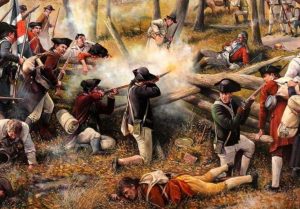
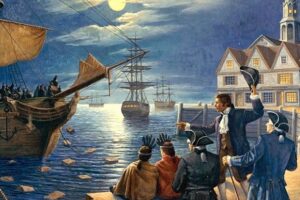 troops to march to Concord, Massachusetts in April 1775, where a Patriot arsenal was known to be located. On April 19, 1775, the British regulars encountered a group of American militiamen at Lexington, and the American Revolutionary War began. The fact was that Patrick Henry saw something that others did not see, that an out of control, oppressive government can be a terribly destructive force, if it is not held at bay.
troops to march to Concord, Massachusetts in April 1775, where a Patriot arsenal was known to be located. On April 19, 1775, the British regulars encountered a group of American militiamen at Lexington, and the American Revolutionary War began. The fact was that Patrick Henry saw something that others did not see, that an out of control, oppressive government can be a terribly destructive force, if it is not held at bay.
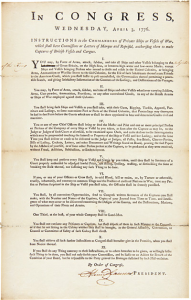 When the United States, still known as the colonies at that time, it lacked sufficient funds to build a strong navy, and with the coming Revolutionary War, they needed that strength. So, the Continental Congress gave privateers permission to attack any and all British ships. What is a privateer, you might ask? A privateer is a private person or ship that engages in maritime warfare under a commission of war.
When the United States, still known as the colonies at that time, it lacked sufficient funds to build a strong navy, and with the coming Revolutionary War, they needed that strength. So, the Continental Congress gave privateers permission to attack any and all British ships. What is a privateer, you might ask? A privateer is a private person or ship that engages in maritime warfare under a commission of war.
In a bill signed by John Hancock, president of the Continental Congress, and dated April 3, 1776, the Continental Congress issued, “INSTRUCTIONS to the COMMANDERS of Private Ships or vessels of War, which shall have Commissions of Letters of Marque and Reprisal, authorizing them to make Captures of British Vessels and Cargoes.” Letters of Marque and Reprisal were the official documents by which 18th century governments commissioned private commercial ships, known as privateers, to act on their behalf, attacking ships carrying the flags of enemy nations. As a perk, any goods captured by the privateer were divided between the ship’s owner and the government that had issued the letter.
Congress informed American privateers on this day that, “YOU may, by Force of Arms, attack, subdue, and take all Ships and other Vessels belonging to the Inhabitants of Great Britain, on the high seas, or between high-water and low-water Marks, except Ships and Vessels bringing Persons who intend to settle and reside in the United Colonies, or bringing Arms, Ammunition or Warlike Stores to the said Colonies, for the Use of such Inhabitants thereof as are Friends to the American Cause, which you shall suffer to pass unmolested, the Commanders thereof permitting a peaceable Search, and giving satisfactory Information of the Contents of the Ladings, and Destinations of the Voyages.” In many ways, this action was very similar to guerrilla warfare, except it was a battle fought on the high seas, and unlike guerrillas, these men were acting under the authority of the government…even if both were fighting for their nation.
For those who faced them on the high seas, there was no difference between pirates and privateers. They 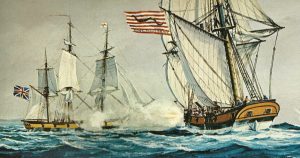 acted and operated identically, boarding and capturing ships using force, if necessary. However, privateers holding Letters of Marque were not subject to prosecution by their home nation and, if captured, were treated as prisoners of war instead of criminals by foreign nations. I wonder if their were actually pirates among he privateers. To me, it would make sense to believe that their were, but perhaps the government would not authorize known pirates to do this work. Either way, the privateer commission was a very successful form of warfare in the Revolutionary War days.
acted and operated identically, boarding and capturing ships using force, if necessary. However, privateers holding Letters of Marque were not subject to prosecution by their home nation and, if captured, were treated as prisoners of war instead of criminals by foreign nations. I wonder if their were actually pirates among he privateers. To me, it would make sense to believe that their were, but perhaps the government would not authorize known pirates to do this work. Either way, the privateer commission was a very successful form of warfare in the Revolutionary War days.

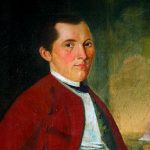 During the years of growing pains for the United States, it was not considered a nation with any power, or in fact, a nation at all. The British wanted to keep he American Colonies under its power for tax purposes, and for the power that comes when a nation owns large areas of land around the globe. The young country…still under the bonds of British rule, was rebelling against what they considered tyranny, however, they would not get very far without military help coming from somewhere. So, on November 29, 1775, the Second Continental Congress, met in Philadelphia, to establish a Committee of Secret Correspondence. The committee’s goal was to provide European nations with a Patriot interpretation of events in Britain’s North American colonies, in the hope of soliciting aid for the American war effort. The committee consisted of Benjamin Franklin, Benjamin Harrison, John Dickinson, John Hay, and Robert Morris. Following the meeting, the committee instructed Silas Deane to meet with French Foreign Minister Charles Gravier, Count de Vergennes, to stress America’s need for military stores and assure the French that the colonies were moving toward “total separation” from Great Britain. Covert French aid began filtering into the colonies soon after the outbreak of hostilities in 1775, but it was not enough. The Americans had to figure out a way to get more aid.
During the years of growing pains for the United States, it was not considered a nation with any power, or in fact, a nation at all. The British wanted to keep he American Colonies under its power for tax purposes, and for the power that comes when a nation owns large areas of land around the globe. The young country…still under the bonds of British rule, was rebelling against what they considered tyranny, however, they would not get very far without military help coming from somewhere. So, on November 29, 1775, the Second Continental Congress, met in Philadelphia, to establish a Committee of Secret Correspondence. The committee’s goal was to provide European nations with a Patriot interpretation of events in Britain’s North American colonies, in the hope of soliciting aid for the American war effort. The committee consisted of Benjamin Franklin, Benjamin Harrison, John Dickinson, John Hay, and Robert Morris. Following the meeting, the committee instructed Silas Deane to meet with French Foreign Minister Charles Gravier, Count de Vergennes, to stress America’s need for military stores and assure the French that the colonies were moving toward “total separation” from Great Britain. Covert French aid began filtering into the colonies soon after the outbreak of hostilities in 1775, but it was not enough. The Americans had to figure out a way to get more aid.
Deane, a Connecticut delegate to the Continental Congress, left for France on the secret mission on March 3, 1776. He managed to negotiate for unofficial assistance from France, in the form of ships containing military supplies, and recruited Gilbert du Motier, the marquis de Lafayette to share his military expertise with the Continental Army’s officer corps. The aid helped some, but America needed a real commitment from France. That was not so easy to obtain, until after the arrival of the charming Benjamin Franklin in France in December 1776. Then, after the American victory at the Battle of Saratoga in October 1777, the French became convinced that it was worth backing the Americans in a formal treaty. On February 6, 1778, the Treaties of Amity and Commerce and Alliance were signed, and in May 1778 the Continental Congress ratified them.
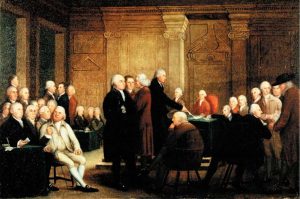
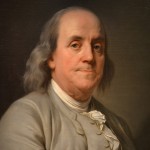 One month later, war between Britain and France formally began when a British squadron fired on two French ships. During the American Revolution, French naval fleets proved critical in the defeat of the British, which was assured after the Battle of Yorktown in October 1781. In reality, this was a spy thriller right out of the likes of James Bond, in that every step of this maneuver was critical to the survival of the United States of America, and everything pretty much went exactly as planned.
One month later, war between Britain and France formally began when a British squadron fired on two French ships. During the American Revolution, French naval fleets proved critical in the defeat of the British, which was assured after the Battle of Yorktown in October 1781. In reality, this was a spy thriller right out of the likes of James Bond, in that every step of this maneuver was critical to the survival of the United States of America, and everything pretty much went exactly as planned.
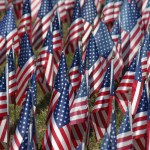 With our nation’s Independence Day upon us, I find myself, like many other Americans, in a rather weary and confused state. So much about our country has changed, that it has almost become unrecognizable to me. The United States of America has always been known as the land of the free and the home of the brave, but now it seems that we are becoming the land of the free, only if we agree with what a select few want, and as for the brave, well it’s becoming very much out of style to stand up for our beliefs, values, or even for our country. I’m not picking on any one group here, but rather I find myself feeling quite sad that the sense of pride we have always felt for our nation is suddenly gone…at least in the minds of some people. I know that everyone really has a right to live their life in the way that they want to, but the problem is that lately everyone wants to tell everyone else how to believe. With that in mind, I thought it fitting to remind people about why our ancestors came here in the first place.
With our nation’s Independence Day upon us, I find myself, like many other Americans, in a rather weary and confused state. So much about our country has changed, that it has almost become unrecognizable to me. The United States of America has always been known as the land of the free and the home of the brave, but now it seems that we are becoming the land of the free, only if we agree with what a select few want, and as for the brave, well it’s becoming very much out of style to stand up for our beliefs, values, or even for our country. I’m not picking on any one group here, but rather I find myself feeling quite sad that the sense of pride we have always felt for our nation is suddenly gone…at least in the minds of some people. I know that everyone really has a right to live their life in the way that they want to, but the problem is that lately everyone wants to tell everyone else how to believe. With that in mind, I thought it fitting to remind people about why our ancestors came here in the first place.
When our forefathers left England, it was to get away from a government that made it a treasonous act to separate from the Church of England. The people who did not agree with the teachings of the Church of England had to leave or they would be killed. That was the reason that the First Amendment to our Constitution says, “Congress shall make no law respecting an establishment of religion, or prohibiting the free exercise thereof; or abridging the freedom of speech, or of the press; or the right of the people peaceably to assemble, and to petition the government for a redress of grievances.” These were very important parts of our 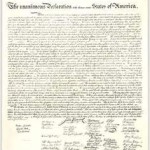 Constitution. The problem is that many people have forgotten those rights, or they have mixed up the meaning, thinking that we are not to have anything to do with religion in our government. That isn’t it at all. It says that the government is to stay out of our religious beliefs. That is not what is happening. Our current government is far too invasive in our religions.
Constitution. The problem is that many people have forgotten those rights, or they have mixed up the meaning, thinking that we are not to have anything to do with religion in our government. That isn’t it at all. It says that the government is to stay out of our religious beliefs. That is not what is happening. Our current government is far too invasive in our religions.
As time went on, England tried to usurp more and more authority over the young colonies. They tried to interfere with religion, economics, and politics. Even though we were a nation basically under them, we knew it could not continue much longer. It was decided that we needed to be independent from England. That was when we knew that we could not continue to be under this type of rule. So, why do we celebrate the 4th of July…Independence Day. We think of July 4, 1776, as a day that represents the Declaration of Independence and the birth of the United States of America as an independent nation. But it wasn’t on July 4, 1776 that the Continental Congress decided to declare independence. That was on July 2, 1776. It wasn’t the day we started the American Revolution either. That had happened back in April 1775. And it wasn’t the day Thomas Jefferson wrote the first draft of the Declaration of Independence. He did that in June 1776. It wasn’t even the date on which the Declaration was delivered to Great Britain. That didn’t happen until November 1776. It wasn’t even the date it was signed. That was August 2, 1776.
No, we celebrate the 4th of July, because that was the day that the Continental Congress approved the final 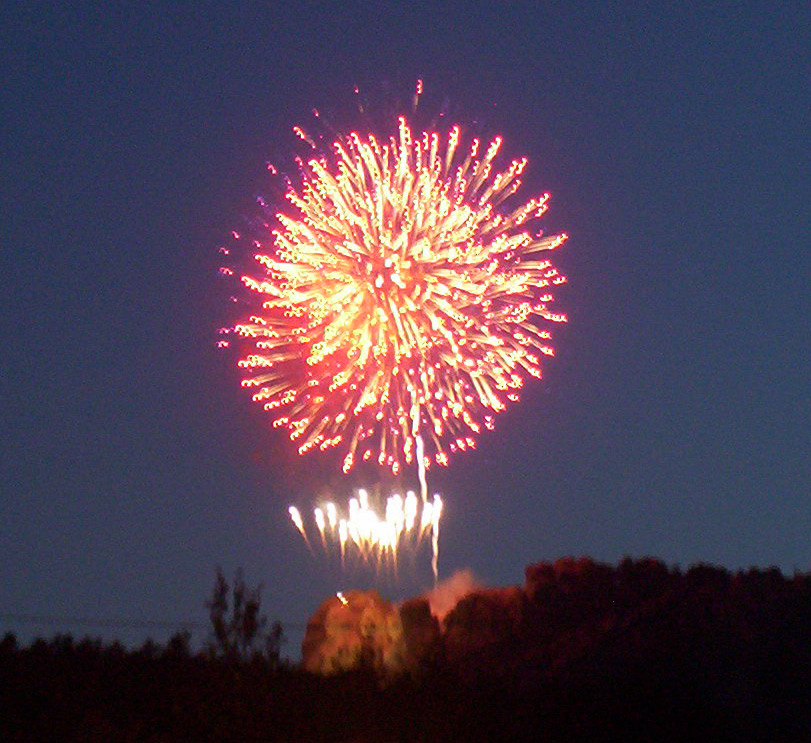 wording of the Declaration of Independence, in 1776. They’d been working on it for a couple of days after the draft was submitted on July 2nd and finally agreed on all of the edits and changes. That was the day that truly represents our Independence. Not the day it was accepted by Britain, but the day we decided to make it our own. That was the day we made freedom and independence our own. It was the day that we decided to live in peace together, with each man, woman, and child having certain rights that should never be denied them. I think some people in our country, and especially our leadership have forgotten that fact in their race to political correctness, anti-racism, and a thinly disguised attempt to control our religious rights.
wording of the Declaration of Independence, in 1776. They’d been working on it for a couple of days after the draft was submitted on July 2nd and finally agreed on all of the edits and changes. That was the day that truly represents our Independence. Not the day it was accepted by Britain, but the day we decided to make it our own. That was the day we made freedom and independence our own. It was the day that we decided to live in peace together, with each man, woman, and child having certain rights that should never be denied them. I think some people in our country, and especially our leadership have forgotten that fact in their race to political correctness, anti-racism, and a thinly disguised attempt to control our religious rights.

